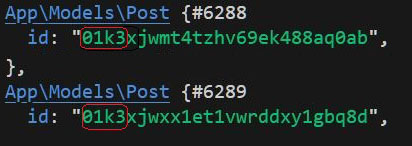🚀 Boost your Laravel apps with globally unique identifiers—covering UUID v4, ULID, and Ordered UUID (UUID v7). Learn when and how to implement each for enhanced security, performance, and scalability.
- UUIDs (v4) — Random, globally unique IDs perfect for preventing ID enumeration and improving security.
- ULIDs — Compact, lexicographically sortable, URL-friendly identifiers.
- Ordered UUIDs (UUID v7) — Time-ordered, high-performance IDs that improve database indexing and write speed.
Dive into how to set them up using Laravel 12 migrations, Eloquent traits (HasUuids & HasUlids), and simple controller methods.
- Security & privacy: Random or non-sequential IDs help prevent attackers from guessing resource counts.
- Global uniqueness: Ideal for distributed systems where merging or syncing across databases matters.
- Performance-friendly: Ordered UUIDs significantly reduce index fragmentation and optimize large table inserts.
| Step | Description |
|---|---|
| 1⃣ | Create UUID-based migration: <code>$table->uuid('id')->primary();</code> |
| 2⃣ | Use HasUuids or HasUlids trait in your model to auto-generate IDs. |
| 3⃣ | Customize UUID generation via newUniqueId() for specific behaviors like UUID v4. |
| 4⃣ | Choose your ID format depending on your use case: |
- Use `Str::uuid()` for random UUIDs
- Use `Str::orderedUuid()` (UUID v7) for better indexing
- Use ULIDs with `HasUlids` trait for short, URL-safe IDs
For full code examples—covering migrations, traits, model configurations, and controller insertion—check out the blog post:
Laravel 12: How to Use UUIDs (with UUID, ULID & Ordered UUID)
Published August 29, 2025, it’s a step-by-step guide tailored for Laravel 12 topics.
- Covers three major ID strategies in one place (UUID, ULID, Ordered UUID).
- Written specifically for Laravel 12, leveraging its latest features.
- Offers both theoretical and practical insights: when to use which type and why.
- Browse related Laravel 12 tutorials like changing date formats, retrieving client IPs, or integrating social logins.
- Explore categories like Helper Functions, UUIDs, or Laravel Eloquent on the blog for more in-depth content.
- ⭐ Star or fork this repo to support open-source guides.
- Share the blog on your developer community—reduces boilerplate, improves Laravel best practices.
- Got feedback or want to contribute? Pull requests and issues are welcome!
Remember: When building robust Laravel applications, choosing the right unique ID format can dramatically impact security, performance, and future scalability.
Happy coding!
— ItStuffSolutions
